The thin film encapsulation (TFE) market is projected to grow from USD 0.2 billion in 2025 to USD 1.1 billion by 2035, with a CAGR of 20.0%. A contribution of volume versus price growth analysis reveals that volume growth plays a more significant role in the market’s expansion, especially during the early phase, while price growth gradually increases as the market matures. Between 2025 and 2030, the market grows from USD 0.2 billion to USD 0.5 billion, contributing USD 0.3 billion in growth, with a CAGR of 22.6%.
The volume contribution dominates this early phase, driven by the increasing adoption of thin film encapsulation technology in flexible electronics, solar panels, and OLED displays. The demand for TFE solutions is primarily driven by their ability to enhance the longevity and reliability of electronic devices, especially in emerging sectors such as wearables and flexible solar panels.
From 2030 to 2035, the market continues to expand from USD 0.5 billion to USD 1.1 billion, contributing USD 0.6 billion in growth, with a CAGR of 16.8%. While volume growth remains the primary contributor, price growth becomes more noticeable as TFE technology advances and economies of scale are achieved. The overall contribution analysis shows that volume growth leads the market’s expansion in the early years, with a growing price influence as the market matures and technological advancements drive higher-value solutions.
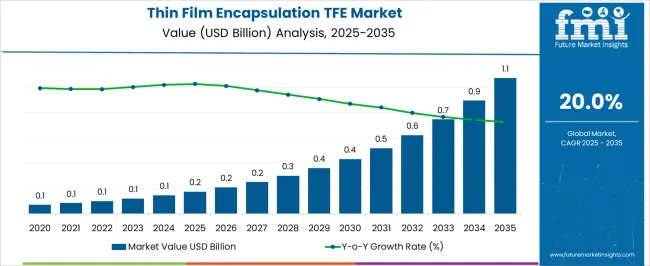
| Metric | Value |
|---|---|
| Thin Film Encapsulation TFE Market Estimated Value in (2025 E) | USD 0.2 billion |
| Thin Film Encapsulation TFE Market Forecast Value in (2035 F) | USD 1.1 billion |
| Forecast CAGR (2025 to 2035) | 20.0% |
The thin film encapsulation market is expanding rapidly as demand grows for advanced protective layers in flexible electronic displays. Industry developments have highlighted the importance of durable thin films to protect sensitive OLED displays from moisture and oxygen, which can degrade performance.
The rise in flexible OLED technology for consumer electronics such as smartphones and wearables has driven the need for high-quality encapsulation solutions. Improvements in deposition techniques have enabled manufacturers to create thinner, more uniform protective layers that enhance display longevity and flexibility.
Additionally, consumer preference for lightweight and bendable devices has fueled innovation in this area. Regulatory emphasis on product reliability and increasing production capacity of flexible displays are expected to support further market expansion. Segment growth is forecasted to be led by inorganic layer deposition due to its superior barrier properties, flexible OLED displays as the primary application, and consumer electronics as the leading end-use industry.
The thin film encapsulation (TFE) market is segmented by deposition type, application, end-use industry, and region.
By Deposition Type: The market is divided into inorganic layer deposition and organic layer deposition.
By Application: The market is classified into flexible OLED displays, flexible OLED lighting, thin-film photovoltaics, and others.
By End-use Industry: The market is segmented into consumer electronics, automotive, renewable energy, healthcare, aerospace & defense, sports & entertainment, and others.
By Region: Regionally, the thin film encapsulation market is categorized into North America, Latin America, Western Europe, Eastern Europe, Balkan & Baltic Countries, Russia & Belarus, Central Asia, East Asia, South Asia & Pacific, and the Middle East & Africa.
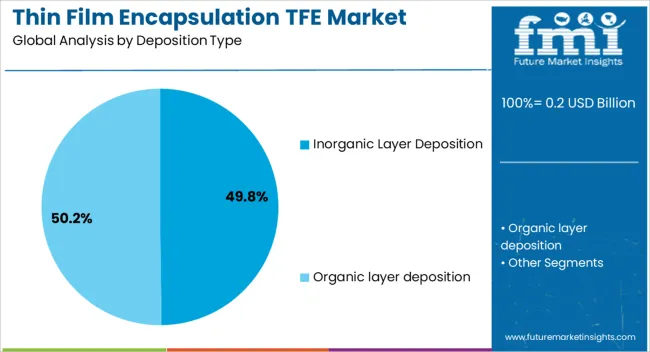
The inorganic layer deposition segment is expected to contribute 49.8% of the thin film encapsulation market revenue in 2025, positioning it as the dominant technology. This method has gained preference due to its excellent barrier performance against moisture and oxygen, crucial for maintaining OLED display integrity.
It provides robust protection while maintaining thin film flexibility, making it ideal for foldable and rollable displays. Advances in deposition equipment have improved layer uniformity and adhesion, enabling reliable large-scale manufacturing.
The segment benefits from growing demand for devices that require high durability and longer operational life. As manufacturers continue to prioritize display performance and lifespan, inorganic layer deposition is anticipated to remain the preferred encapsulation method.
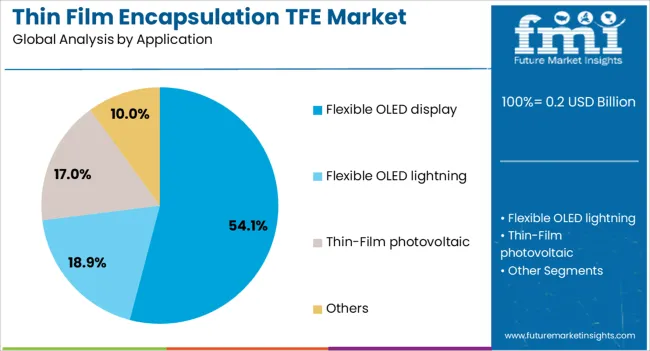
The flexible OLED display segment is projected to hold 54.1% of the thin film encapsulation market revenue in 2025, securing its position as the leading application. Growth in this segment has been driven by the consumer demand for innovative device form factors that offer flexibility, lightweight design, and enhanced visual quality.
Flexible OLEDs are increasingly used in smartphones, wearable devices, and foldable screens where durable encapsulation is essential to prevent degradation. Advances in thin film technology have enabled the production of displays that can bend and fold without compromising performance.
The segment benefits from the rapid adoption of flexible displays in consumer electronics and the ongoing development of new device categories. As market penetration of flexible OLEDs increases, the demand for effective thin film encapsulation solutions will continue to rise.
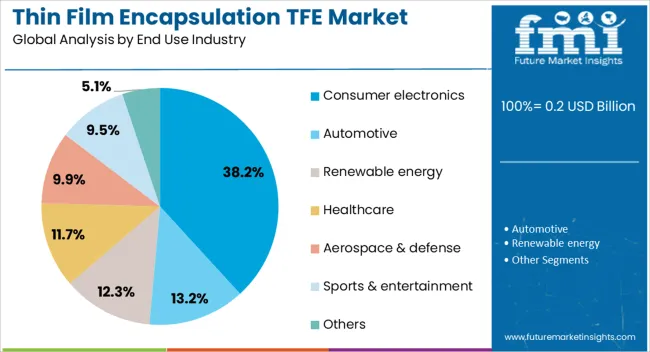
The consumer electronics segment is expected to contribute 38.2% of the thin film encapsulation market revenue in 2025, maintaining its dominance as the primary end-use industry. This segment’s growth has been propelled by the proliferation of smart devices including smartphones, tablets, and wearables that integrate flexible displays.
Manufacturers in this industry prioritize thin film encapsulation to ensure product reliability, longevity, and consumer satisfaction. The fast-paced innovation cycles in consumer electronics require encapsulation technologies that support high performance and design flexibility.
Furthermore, rising consumer expectations for durable and sleek devices have pushed demand for advanced encapsulation methods. As consumer electronics continue to adopt flexible display technologies, this segment is set to remain a key driver of market growth.
The thin film encapsulation (TFE) market is growing due to its increasing use in the protection of organic electronics, especially in applications like organic light-emitting diodes (OLEDs), solar cells, and flexible electronics. TFE technology provides an effective barrier against moisture, oxygen, and other environmental factors, which is crucial for the long-term durability and performance of organic devices.
The rise in demand for flexible displays, wearable technology, and renewable energy sources is driving market expansion. Despite challenges such as high production costs and scalability issues, advancements in material technology and the increasing focus on energy-efficient solutions present opportunities for growth in the market.
The primary driver for the growth of the thin film encapsulation market is the increasing adoption of organic electronics, particularly OLED displays, and flexible electronics. As the demand for high-performance, energy-efficient displays rises, TFE solutions are becoming essential for protecting sensitive organic materials from environmental degradation, such as moisture and oxygen.
In addition, flexible displays and wearable technologies, which require lightweight, durable, and bendable components, are driving the demand for thin film encapsulation. The rise in consumer electronics, smart devices, and renewable energy applications, such as organic solar cells, further contributes to the growing demand for TFE technology, offering a robust and cost-effective solution for protecting delicate organic materials used in these devices.
A significant challenge in the thin film encapsulation market is the high production cost associated with TFE materials and processes. The materials used for encapsulation, such as barrier films, are expensive, and the application of these materials often involves complex manufacturing processes. These high costs can limit the widespread adoption of TFE in industries with price sensitivity, such as consumer electronics and affordable renewable energy solutions. Additionally, scalability remains an issue as current TFE technologies are often optimized for smaller-scale applications, making it difficult to apply them efficiently to mass production. Overcoming these cost and scalability barriers is crucial for the market's growth, requiring innovation in material development and production techniques.
The thin film encapsulation market presents significant opportunities through advancements in material technology and the expanding applications of organic electronics. Innovations in barrier materials, such as the development of more efficient and cost-effective thin films, are enhancing the capabilities of TFE technology, allowing it to be applied in a wider range of industries. The growing adoption of flexible and wearable electronics in industries like healthcare, automotive, and entertainment provides ample opportunities for TFE solutions. Additionally, the continued development of organic solar cells, which require efficient encapsulation for performance and durability, offers new growth prospects for the market. As manufacturers focus on reducing costs while maintaining high performance, TFE technology is becoming an increasingly viable solution for large-scale applications.
A key trend in the thin film encapsulation market is the increasing integration of TFE technology with flexible and wearable electronics. As wearable devices, such as smartwatches, health trackers, and fitness devices, become more popular, the demand for thin and durable encapsulation solutions is rising. TFE allows for the protection of organic materials in these flexible devices without compromising their flexibility or performance. Additionally, there is growing interest in integrating TFE with renewable energy applications, such as organic solar cells, to enhance the longevity and efficiency of these systems. As advancements in materials science and manufacturing processes continue, the market is seeing the development of encapsulation solutions that are not only cost-effective but also highly adaptable to emerging technologies in electronics and energy.
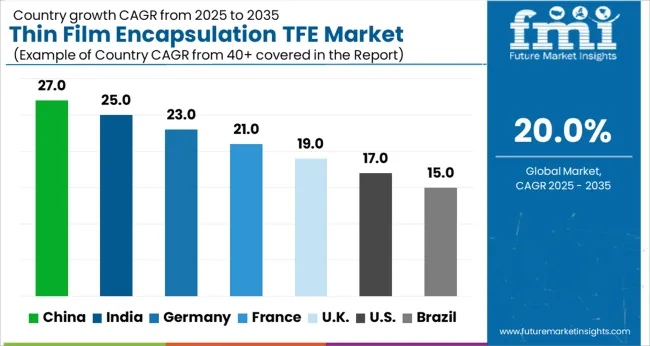
The thin film encapsulation (TFE) Market is projected to grow at a CAGR of 20% globally from 2025 to 2035. China leads the market with a growth rate of 27.0%, followed by India at 25.0% and France at 21.0%. The United Kingdom is expected to grow at 19.0%, while the United States shows a growth rate of 17.0%. The rapid adoption of flexible electronics, particularly in solar cells and OLED displays, is driving the demand for thin film encapsulation solutions. The high growth rates in emerging markets such as China and India are driven by industrial expansion, innovation, and increasing investments in renewable energy sources. Developed markets like France, the UK, and the USA continue to experience steady growth with advancements in smart devices and energy-efficient technologies. The analysis spans 40+ countries, with the leading markets shown below.
Demand for thin film encapsulation in China is growing at a 27.0% CAGR through 2035. China’s rapidly expanding electronics and solar energy industries are the main drivers behind the strong market growth. As China continues to lead in the production of solar panels and electronic devices, the need for advanced thin film encapsulation solutions to enhance product longevity and performance is rising. Additionally, China’s significant investment in renewable energy infrastructure and clean technologies is boosting the adoption of TFE in various applications, particularly in the solar sector.
The thin film encapsulation mzarket in India is projected to grow at a 25.0% CAGR through 2035. India’s growing focus on solar energy, along with its expanding electronics manufacturing sector, is fueling demand for thin film encapsulation solutions. The increasing adoption of solar power projects and the shift towards energy-efficient devices are driving the need for advanced encapsulation technologies to protect solar cells and electronics. Government incentives to promote renewable energy, coupled with a rapidly expanding consumer electronics market, further contribute to the market growth in India.
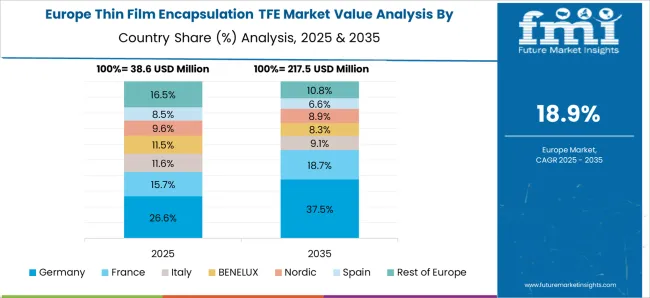
Sale of thin film encapsulation in France is growing at a 21.0% CAGR through 2035. France’s growing investment in renewable energy and the increasing adoption of thin film solar technology are key drivers of the TFE market. The country’s commitment to reducing carbon emissions and promoting clean energy sources is accelerating the demand for high-performance thin film encapsulation solutions. Additionally, France’s well-established electronics sector and its push toward energy-efficient devices are contributing to the increasing adoption of TFE for electronic components and displays
The UK market for thin film encapsulation is expected to grow at a 19.0% CAGR through 2035. The demand for TFE in the UK is largely driven by the country’s focus on clean energy and the expansion of the electronics industry. As the UK increases its renewable energy capacity and the adoption of solar power, the need for advanced encapsulation solutions to improve the efficiency and longevity of solar cells is growing. The rise of energy-efficient electronic devices and government regulations pushing for sustainable manufacturing practices also contribute to the market growth. <
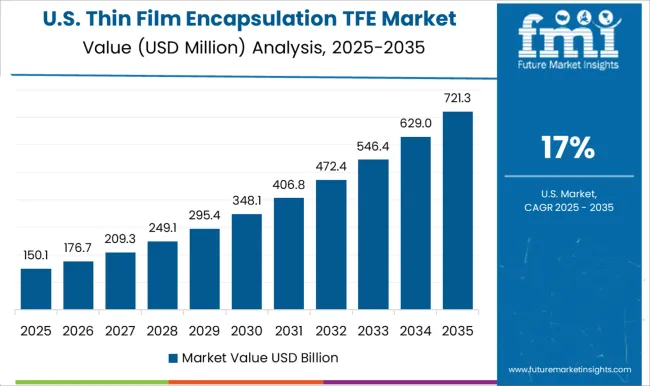
Demand for Thin Film Encapsulation in the USA is projected to grow at a 17.0% CAGR through 2035. The USA is experiencing steady growth in the adoption of thin film encapsulation technologies, driven by the increasing focus on renewable energy and the rise of solar power projects. The expanding electronics sector, particularly in OLED displays and other advanced devices, also contributes to the market’s growth. The USA government’s support for clean energy technologies and its push for energy efficiency in manufacturing further promote the use of TFE solutions across industries.
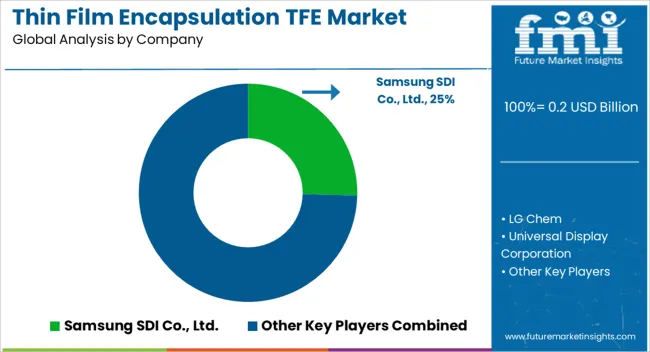
The thin film encapsulation (TFE) market is driven by key players that offer advanced materials designed to protect sensitive electronic components, such as OLED displays and photovoltaic cells, from environmental factors. Samsung SDI Co., Ltd. is a prominent market leader, known for its high-quality thin film encapsulation technologies used in flexible and organic electronics, especially for OLED displays. LG Chem provides innovative thin film encapsulation solutions focused on improving the longevity and performance of OLED displays and solar cells, with an emphasis on flexibility and reliability.
Universal Display Corporation specializes in providing TFE materials, particularly for OLED technology, offering encapsulation solutions that improve the durability and stability of OLED displays, making them suitable for a wide range of consumer electronics applications. 3M is a significant player, offering advanced thin film materials that provide superior protection, moisture resistance, and barrier performance for OLED and flexible electronics, with a focus on integrating sustainable materials.
Applied Materials, Inc. offers cutting-edge thin film deposition technologies and encapsulation solutions, contributing to the development of high-performance displays and photovoltaic cells. Meyer Burger Technology AG provides thin film encapsulation solutions primarily focused on enhancing solar cell performance, offering high-quality materials designed for improved energy efficiency and durability. Toray Industries, Inc. specializes in providing thin film materials with excellent moisture and oxygen barrier properties, ensuring longer lifespans for electronic components and solar cells.
| Item | Value |
|---|---|
| Quantitative Units | USD Billion |
| Deposition Type | Inorganic Layer Deposition and Organic layer deposition |
| Application | Flexible OLED display, Flexible OLED lightning, Thin-Film photovoltaic, and Others |
| End Use Industry | Consumer electronics, Automotive, Renewable energy, Healthcare, Aerospace & defense, Sports & entertainment, and Others |
| Regions Covered | North America, Europe, Asia-Pacific, Latin America, Middle East & Africa |
| Country Covered | United States, Canada, Germany, France, United Kingdom, China, Japan, India, Brazil, South Africa |
| Key Companies Profiled | Samsung SDI Co., Ltd., LG Chem, Universal Display Corporation, 3M, Applied Materials, Inc., Meyer Burger Technology AG, and Toray Industries, Inc. |
| Additional Attributes | Dollar sales by product type (OLED encapsulation films, photovoltaic encapsulation films, flexible electronics encapsulation) and end-use segments (consumer electronics, photovoltaics, automotive, medical devices, industrial applications). Demand dynamics are influenced by the increasing adoption of flexible and organic electronics, rising demand for energy-efficient solar cells, and the need for enhanced durability in sensitive electronic components. Regional trends show strong growth in North America and Europe, driven by the demand for OLED technology and renewable energy, while Asia-Pacific is expanding rapidly due to the growing electronic manufacturing industry and investments in solar energy. |
The global thin film encapsulation TFE market is estimated to be valued at USD 0.2 billion in 2025.
The market size for the thin film encapsulation TFE market is projected to reach USD 1.1 billion by 2035.
The thin film encapsulation TFE market is expected to grow at a 20.0% CAGR between 2025 and 2035.
The key product types in thin film encapsulation TFE market are inorganic layer deposition, _pecvd (plasma-enhanced chemical vapor deposition), _ald (atomic layer deposition), _pvd (physical vapor deposition), organic layer deposition, _vacuum thermal evaporation and _inkjet printing.
In terms of application, flexible oled display segment to command 54.1% share in the thin film encapsulation TFE market in 2025.






Our Research Products

The "Full Research Suite" delivers actionable market intel, deep dives on markets or technologies, so clients act faster, cut risk, and unlock growth.

The Leaderboard benchmarks and ranks top vendors, classifying them as Established Leaders, Leading Challengers, or Disruptors & Challengers.

Locates where complements amplify value and substitutes erode it, forecasting net impact by horizon

We deliver granular, decision-grade intel: market sizing, 5-year forecasts, pricing, adoption, usage, revenue, and operational KPIs—plus competitor tracking, regulation, and value chains—across 60 countries broadly.

Spot the shifts before they hit your P&L. We track inflection points, adoption curves, pricing moves, and ecosystem plays to show where demand is heading, why it is changing, and what to do next across high-growth markets and disruptive tech

Real-time reads of user behavior. We track shifting priorities, perceptions of today’s and next-gen services, and provider experience, then pace how fast tech moves from trial to adoption, blending buyer, consumer, and channel inputs with social signals (#WhySwitch, #UX).

Partner with our analyst team to build a custom report designed around your business priorities. From analysing market trends to assessing competitors or crafting bespoke datasets, we tailor insights to your needs.
Supplier Intelligence
Discovery & Profiling
Capacity & Footprint
Performance & Risk
Compliance & Governance
Commercial Readiness
Who Supplies Whom
Scorecards & Shortlists
Playbooks & Docs
Category Intelligence
Definition & Scope
Demand & Use Cases
Cost Drivers
Market Structure
Supply Chain Map
Trade & Policy
Operating Norms
Deliverables
Buyer Intelligence
Account Basics
Spend & Scope
Procurement Model
Vendor Requirements
Terms & Policies
Entry Strategy
Pain Points & Triggers
Outputs
Pricing Analysis
Benchmarks
Trends
Should-Cost
Indexation
Landed Cost
Commercial Terms
Deliverables
Brand Analysis
Positioning & Value Prop
Share & Presence
Customer Evidence
Go-to-Market
Digital & Reputation
Compliance & Trust
KPIs & Gaps
Outputs
Full Research Suite comprises of:
Market outlook & trends analysis
Interviews & case studies
Strategic recommendations
Vendor profiles & capabilities analysis
5-year forecasts
8 regions and 60+ country-level data splits
Market segment data splits
12 months of continuous data updates
DELIVERED AS:
PDF EXCEL ONLINE
Thin Film Coatings Market Size and Share Forecast Outlook 2025 to 2035
Thin-film Platinum Resistance Market Size and Share Forecast Outlook 2025 to 2035
Thin Film Platinum Resistance Temperature Sensor Market Size and Share Forecast Outlook 2025 to 2035
Thin Film Solar Cells Market Size and Share Forecast Outlook 2025 to 2035
Thin Film Photovoltaics Market Size and Share Forecast Outlook 2025 to 2035
Thin Film Solar PV Backsheet Market Size and Share Forecast Outlook 2025 to 2035
Thin Film Battery Market Size and Share Forecast Outlook 2025 to 2035
Thin Film and Printed Batteries Market Trends - Growth & Forecast 2025 to 2035
Thin Film Photovoltaic Modules Market
ePTFE Filter Film Market Size and Share Forecast Outlook 2025 to 2035
ePTFE Electronic Film Market Size and Share Forecast Outlook 2025 to 2035
Flexible Thin Film Market Trends - Growth & Forecast 2025 to 2035
EVOH Encapsulation Film Market Size and Share Forecast Outlook 2025 to 2035
Rechargeable Thin Film Battery Market Size and Share Forecast Outlook 2025 to 2035
Non-rechargeable Thin Film Battery Market Size and Share Forecast Outlook 2025 to 2035
Film and TV IP Peripherals Market Size and Share Forecast Outlook 2025 to 2035
Film Wrapped Wire Market Size and Share Forecast Outlook 2025 to 2035
Film-Insulated Wire Market Size and Share Forecast Outlook 2025 to 2035
Film Forming Starches Market Size and Share Forecast Outlook 2025 to 2035
Film Formers Market Size and Share Forecast Outlook 2025 to 2035

Thank you!
You will receive an email from our Business Development Manager. Please be sure to check your SPAM/JUNK folder too.
Chat With
MaRIA